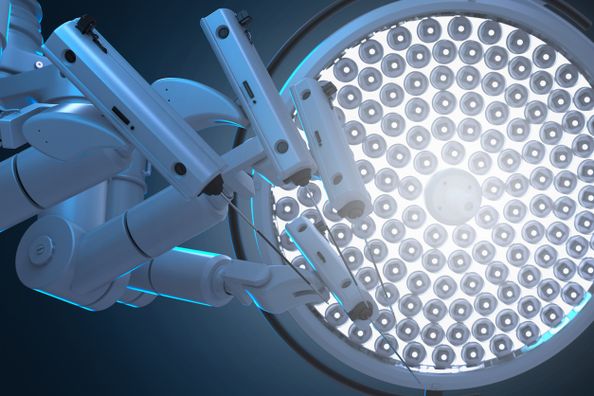Referred to by many as robotic surgery for prostate cancer, or robotic prostatectomy, da Vinci Prostatectomy is more accurately a robot-assisted, minimally invasive surgery that is quickly becoming the preferred treatment for removal of the prostate following early diagnosis of prostate cancer. In fact, studies suggest that da Vinci Prostatectomy may be the most effective, least invasive prostate surgery performed today.
Though any diagnosis of cancer can be traumatic, the good news is that if your doctor recommends prostate surgery, the cancer was probably caught early. And, with da Vinci Prostatectomy, the likelihood of a complete recovery from prostate cancer without long-term side effects is, for most patients, better than it has ever been.
da Vinci Prostatectomy is performed with the assistance of the da Vinci Surgical System — the latest evolution in robotics technology. The da Vinci Surgical System enables surgeons to operate with unmatched precision and control using only a few small incisions. Recent studies suggest that da Vinci Prostatectomy may offer improved cancer control and a faster return to potency and continence. da Vinci Prostatectomy also offers these potential benefits:
- Significantly less pain
- Less blood loss
- Fewer complications
- Less scarring
- A shorter hospital stay
- And a faster return to normal daily activities
Imagine major surgery performed through the smallest of incisions. Imagine having the benefits of a definitive treatment but with the potential for significantly less pain, a shorter hospital stay, faster return to normal daily activities as well as the potential for better clinical outcomes.
In prostate cancer treatment, millimeters matter. Nerve fibers and blood vessels are attached to the prostate gland. To spare these nerves, they must be delicately and precisely separated from the prostate before its removal. Surgeons use the precision, vision and control provided by da Vinci to assist them in removal of the cancerous prostate while preserving important nerves and blood vessels.
In terms of cancer control, in several large published studies, da Vinci Prostatectomy has shown equal or lower rates of positive surgical margins (meaning margins with cancer cells left behind) than large studies of other forms of surgery.
Other great concerns for prostate cancer patients: urinary continence and sexual function after treatment. Studies show patients who undergo a da Vinci Prostatectomy may experience a faster return of urinary continence following surgery and a lower rates of urinary pain than radiation (brachytherapy) patients. Several studies also show that patients who are potent prior to surgery have experienced a high level of recovery of sexual function (defined as an erection for intercourse) within a year following da Vinci Surgery. Talk to your surgeon about reasonable expectations for recovery of sexual function and a rehabilitation program that may include exercises and drug therapy.
It is important to know that da Vinci surgery does not place a robot at the controls; your surgeon is always in control of every aspect of the surgery with the assistance of the da Vinci robotic surgical system.
While clinical studies support the effectiveness of the da Vinci System when used in minimally invasive surgery, individual results may vary. Surgery with the da Vinci Surgical System may not be appropriate for every individual. Always ask your doctor about all treatment options, as well as their risks and benefits.
Content provided by Intuitive Surgical. For more information on this topic, please visit www.davincisurgery.com
Health Topics:







